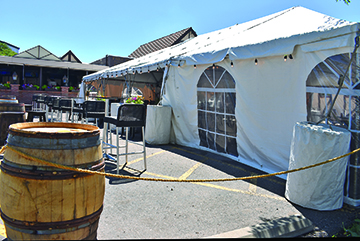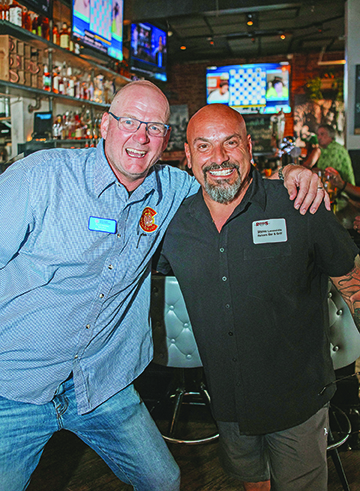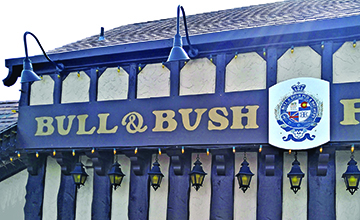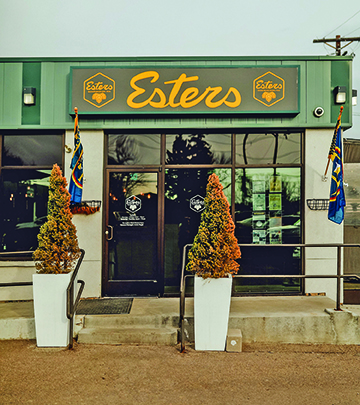by Charles C. Bonniwell

Bull & Bush Expansion: The tent was established during the Covid 19 era with the assistance of the City of Glendale and still stands today for overflow customers.
It is widely acknowledged that one of the joys of urban living is the availability of a wide array of restaurants of all different types and cuisines. But it has been extensively reported that many Denver restaurants are suffering with the number of restaurants dropping a whopping 22% since 2021 according Denver’s Department of Excise and Licenses.
At the same time according to the sales tax records of the city of Glendale, which is completely surrounded by the city of Denver, the restaurants have been experiencing steady growth every year since 2021.

Popular Restaurant Owner: Paul Sullivan, owner of Esters Neighborhood Pub operates two locations in Denver, and one in Wheat Ridge.
Minimum Wage
One of the key reasons for the disparity is the minimum wage differential for tipped employees between the two cities. Denver imposes a minimum of $15.79 per hour compared to $11.79 per hour in Glendale. Moreover, Denver has a very complex set of rules concerning what the minimum wage entails. Denver restaurants have had to pass those added costs to the customers who are price sensitive these days or suffer on the restaurants’ bottom line.
“The tipped minimum wage has ripple effects,” said Paul Sullivan, owner of Esters Neighborhood Pub. “We have cut back significantly on benefits that we offer to our co-workers that we had offered for years, we have reduced the number of people and the number of hours, and we are still making less money because of the tipped minimum wage. This comes directly out of the operator’s bottom line and that crushes us.”
COVID 19

Restaurateurs: Steve Lemonidis, General Manager of Reivers Bar & Grill (right), and Dave Peterson, co-owner of the Bull & Bush Brewery in Glendale, have different experiences when operating in their respective cities.
COVID 19 badly hurt restaurants throughout Colorado starting in 2020 but Denver’s approach was far more harmful than Glendale’s. According to Glendale restaurant owners the city tried to ameliorate the draconian restrictions imposed by the Tri County Health Department (who had jurisdiction over the city) and led the fight to in fact dissolve Tri County Health due to its draconian bureaucratic approach to the crisis.
David Peterson, co-owner of the Bull & Bush Brewery in Glendale, said, “During COVID, we put up a giant 100-person heated tent because, for a time, you could only serve food and drink outdoors. The permitting process in Glendale was extremely simple and took about 10 minutes and the permit was granted immediately for a change of premise liquor license.”
“To this day, we still use the tent as overflow,” said Peterson. “The city came to me and suggested altering the change of premises from temporary to permanent. That way, I didn’t need to reapply every year. They [the city] were proactive in something I should have been proactive in.”
The attitude of Denver was quite the opposite according to Steve Lemonidis the general manager of Reivers Bar & Grill in the Wash Park neighborhood of Denver. The city, he indicated, refused to educate his staff on exactly what the rules were but simply sent in inspectors who constantly handed out citations. For his restaurant the myriads of citations totaled $53,000 and failure to pay immediately would have resulted in revocation of the liquor license and the closure of the business.
“There was no explanation on where the restrictions came from,” said Lemonidis. “Yet, our mayor [Hancock] was on an airplane on Thanksgiving morning telling us all not to be with our families, but yet he was on an airplane to fly to see his family on Thanksgiving Day. It seems like the city was talking out of both sides of their mouth and it hurt us.”
The bureaucratic, almost anti-business, attitude toward restaurants is somewhat surprising given the fact that Denver’s most noted recent mayor (2003-2011) U.S. Senator John Hickenlooper was a restaurateur, as owner of restaurants such as Wynkoop Brewery, Wazee Supper Club, and Cherry Cricket.
But his successor, Michael Hancock, was attentive to the needs of real estate developers and not much else, while the new mayor Mike Johnston concentrates his administration’s efforts on the homeless who do not go to restaurants very often.
As Troy Guard the owner and chef of Guard and Grace told the Colorado Sun, “Honestly, I love Denver … But it’s becoming more and more difficult to open restaurants.”
Red Tape

Glendale: Bull & Bush Brewery opened their restaurant in Glendale in 1971. It is the oldest restaurant in Glendale. Photo by Mae Lynn Photography
One of the reasons businessmen do not want to open a restaurant in Denver these days is the enormous amount of red tape involved in building permits, inspection reviews, construction restriction, greenhouse gas rules, etc. Denver estimates the time to go through its process for a new restaurant is eight months, but those who have undergone the process say that a year or more can be anticipated.
In Glendale the process can be completed in weeks. Dave Peterson of the Bull & Bush noted he recently had to install a new roof and had to get the approval from the City of Glendale and Xcel Energy. When he indicated that he thought if he called the city he could get an inspection that afternoon the Xcel Energy official he was working with (who was used to working in Denver) laughed saying it would take weeks if not months to schedule an inspection. Glendale came over that afternoon, and as a result the restaurant had to close only half a day for the roof replacement.
Parking
An ever-growing problem for Denver restaurants in various parts of the city is ever diminishing parking in Denver. The city’s goal is to make parking increasingly difficult to force its citizens, and anyone traveling to Denver, to take public transportation for the purpose of limiting greenhouse gases and other societal goals.
Glendale, on the other hand, has not only not decreased parking but is expanding it. Glendale is presently finishing a seven story 1,200 car garage facility on Virginia Avenue to help its Four Mile Entertainment District which will house various restaurants and bars.
Glendale’s City Manager Chuck Line stated that: “We are taking the exact opposite approach from Denver. I believe restaurants and other businesses in Glendale will prosper because of it.”

Denver: Esters Neighborhood Pub opened their location in Virginia Village over nine years ago (pictured) and their location in Park Hill six years ago. Photo by Mae Lynn Photography
Crime And Homelessness
Restaurants in various parts of Denver such as Downtown suffer from the perception that they are not in a safe area and suffer from the homeless encampments. On the night of January 11, 2025, a 24-year old man stabbed four people on the 16th Street Mall, killing two. Pro forma statements about Downtown safety by Mayor Mike Johnston did little to improve the adverse publicity.
In Glendale there are simply no homeless encampments, Dave Peterson notes that the Glendale police respond to calls in minutes. He knows of no-one who feels unsafe in Glendale.
Look Toward The Future
Paul Sullivan who owns two Esters Neighborhood Pubs in Denver opined, “The cost of doing business recently, in the city of Denver specifically, is not sustainable at the current moment. There are a few different reasons, and it is sort of like death by a thousand cuts. There is a lot of stuff coming at us in the city of Denver.”
The fact that there are still over 2,000 restaurants in Denver is a testament to the resilience of the restaurant community in the city. However, it is difficult to see why the number of restaurants in the city will not continue to drop unless and until Denver’s Mayor Mike Johnston and his Administration decide to reach out to restaurateurs and start to address their many concerns on how the city operates with regard to its restaurant industry.
Glendale, on the other hand, appears to be poised to undergo boom times such as it hasn’t experienced since the 1970s.
